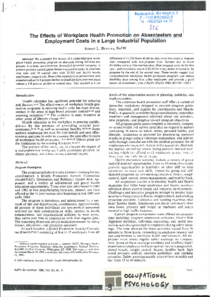The effects of workplace health promotion on absenteeism and employment costs in a large industrial population

American Journal of Public Health
1990
80
9
1101-1105
economic impact ; health programme ; plant safety and health organization ; psychology of absenteeism ; sick leave
English
The impact of a comprehensive workplace health promotion program on absenteeism and employment costs was assessed in a large industrial population. The health promotion program consisted of five core elements including training for site coordinators, a health promotion activity committee, orientation and publicity, health risk appraisal, and a variety of self directed and group health education opportunities. A pretest/posttest referent group design was used to study 41 intervention sites and 19 referent sites with 29,315 and 14,573 hourly employees, respectively. Blue collar workers at intervention sites experienced a 14% decline in disability days over two years versus a 5.8% decline at referent sites. This resulted in a net difference of 11,726 fewer disability days over two years at program sites compared with nonprogram sites. Savings due to lower disability costs at intervention sites offset program costs in the first year and provided a return of over two dollars for every dollar invested in the program by the end of the second year. The author concludes that comprehensive workplace health promotion programs appear to reduce disability days among blue collar employees and provide a good return on investment.
Digital
The ETUI is co-funded by the European Union. Views and opinions expressed are however those of the author(s) only and do not necessarily reflect those of the European Union or the ETUI.